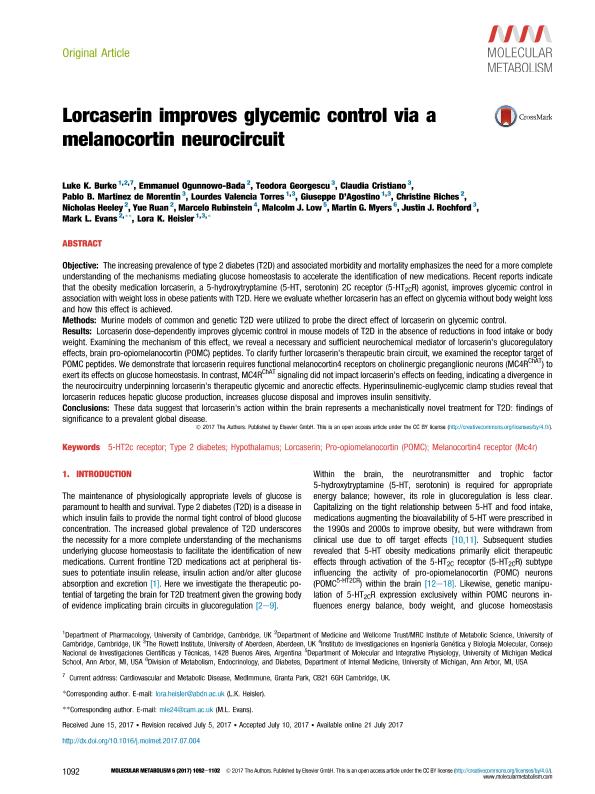Mostrar el registro sencillo del ítem
dc.contributor.author
Burke, Luke K.
dc.contributor.author
Ogunnowo-Bada, Emmanuel
dc.contributor.author
Georgescu, Teodora
dc.contributor.author
Cristiano, Claudia

dc.contributor.author
de Morentin, Pablo B. Martinez
dc.contributor.author
Valencia Torres, Lourdes
dc.contributor.author
D'Agostino, Giuseppe
dc.contributor.author
Riches, Christine
dc.contributor.author
Heeley, Nicholas
dc.contributor.author
Ruan, Yue
dc.contributor.author
Rubinstein, Marcelo

dc.contributor.author
Low, Malcolm J.

dc.contributor.author
Myers, Martin G.
dc.contributor.author
Rochford, Justin J.
dc.contributor.author
Evans, Mark L.
dc.contributor.author
Heisler, Lora K.

dc.date.available
2018-12-03T17:05:45Z
dc.date.issued
2017-10
dc.identifier.citation
Burke, Luke K.; Ogunnowo-Bada, Emmanuel; Georgescu, Teodora; Cristiano, Claudia; de Morentin, Pablo B. Martinez; et al.; Lorcaserin improves glycemic control via a melanocortin neurocircuit; Elsevier Gmbh; Molecular Metabolism; 6; 10; 10-2017; 1092-1102
dc.identifier.issn
2212-8778
dc.identifier.uri
http://hdl.handle.net/11336/65596
dc.description.abstract
Objective: The increasing prevalence of type 2 diabetes (T2D) and associated morbidity and mortality emphasizes the need for a more complete understanding of the mechanisms mediating glucose homeostasis to accelerate the identification of new medications. Recent reports indicate that the obesity medication lorcaserin, a 5-hydroxytryptamine (5-HT, serotonin) 2C receptor (5-HT2CR) agonist, improves glycemic control in association with weight loss in obese patients with T2D. Here we evaluate whether lorcaserin has an effect on glycemia without body weight loss and how this effect is achieved. Methods: Murine models of common and genetic T2D were utilized to probe the direct effect of lorcaserin on glycemic control. Results: Lorcaserin dose-dependently improves glycemic control in mouse models of T2D in the absence of reductions in food intake or body weight. Examining the mechanism of this effect, we reveal a necessary and sufficient neurochemical mediator of lorcaserin's glucoregulatory effects, brain pro-opiomelanocortin (POMC) peptides. To clarify further lorcaserin's therapeutic brain circuit, we examined the receptor target of POMC peptides. We demonstrate that lorcaserin requires functional melanocortin4 receptors on cholinergic preganglionic neurons (MC4RChAT) to exert its effects on glucose homeostasis. In contrast, MC4RChAT signaling did not impact lorcaserin's effects on feeding, indicating a divergence in the neurocircuitry underpinning lorcaserin's therapeutic glycemic and anorectic effects. Hyperinsulinemic-euglycemic clamp studies reveal that lorcaserin reduces hepatic glucose production, increases glucose disposal and improves insulin sensitivity. Conclusions: These data suggest that lorcaserin's action within the brain represents a mechanistically novel treatment for T2D: findings of significance to a prevalent global disease.
dc.format
application/pdf
dc.language.iso
eng
dc.publisher
Elsevier Gmbh

dc.rights
info:eu-repo/semantics/openAccess
dc.rights.uri
https://creativecommons.org/licenses/by/2.5/ar/
dc.subject
5-HT2C RECEPTOR
dc.subject
HYPOTHALAMUS
dc.subject
LORCASERIN
dc.subject
MELANOCORTIN4 RECEPTOR (MC4R)
dc.subject
PRO-OPIOMELANOCORTIN (POMC)
dc.subject
TYPE 2 DIABETES
dc.subject.classification
Otras Ciencias Biológicas

dc.subject.classification
Ciencias Biológicas

dc.subject.classification
CIENCIAS NATURALES Y EXACTAS

dc.title
Lorcaserin improves glycemic control via a melanocortin neurocircuit
dc.type
info:eu-repo/semantics/article
dc.type
info:ar-repo/semantics/artículo
dc.type
info:eu-repo/semantics/publishedVersion
dc.date.updated
2018-10-23T20:18:15Z
dc.journal.volume
6
dc.journal.number
10
dc.journal.pagination
1092-1102
dc.journal.pais
Alemania

dc.journal.ciudad
Múnich
dc.description.fil
Fil: Burke, Luke K.. University of Cambridge; Estados Unidos
dc.description.fil
Fil: Ogunnowo-Bada, Emmanuel. University of Cambridge; Estados Unidos
dc.description.fil
Fil: Georgescu, Teodora. University of Aberdeen; Reino Unido
dc.description.fil
Fil: Cristiano, Claudia. University of Aberdeen; Reino Unido
dc.description.fil
Fil: de Morentin, Pablo B. Martinez. University of Aberdeen; Reino Unido
dc.description.fil
Fil: Valencia Torres, Lourdes. University of Aberdeen; Reino Unido. University of Cambridge; Estados Unidos
dc.description.fil
Fil: D'Agostino, Giuseppe. University of Cambridge; Estados Unidos. University of Aberdeen; Reino Unido
dc.description.fil
Fil: Riches, Christine. University of Cambridge; Estados Unidos
dc.description.fil
Fil: Heeley, Nicholas. University of Cambridge; Estados Unidos
dc.description.fil
Fil: Ruan, Yue. University of Cambridge; Estados Unidos
dc.description.fil
Fil: Rubinstein, Marcelo. Consejo Nacional de Investigaciones Científicas y Técnicas. Instituto de Investigaciones en Ingeniería Genética y Biología Molecular "Dr. Héctor N. Torres"; Argentina
dc.description.fil
Fil: Low, Malcolm J.. University of Michigan; Estados Unidos
dc.description.fil
Fil: Myers, Martin G.. University of Michigan; Estados Unidos
dc.description.fil
Fil: Rochford, Justin J.. University of Aberdeen; Reino Unido
dc.description.fil
Fil: Evans, Mark L.. University of Cambridge; Estados Unidos
dc.description.fil
Fil: Heisler, Lora K.. University of Aberdeen; Reino Unido. University of Cambridge; Estados Unidos
dc.journal.title
Molecular Metabolism
dc.relation.alternativeid
info:eu-repo/semantics/altIdentifier/doi/https://dx.doi.org/10.1016/j.molmet.2017.07.004
dc.relation.alternativeid
info:eu-repo/semantics/altIdentifier/url/https://linkinghub.elsevier.com/retrieve/pii/S2212877817304258
Archivos asociados
